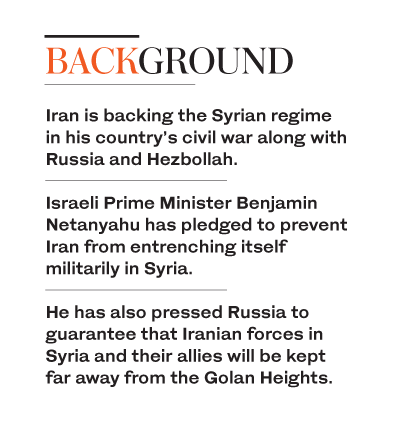
JERUSALEM: Israeli Prime Minister Benjamin Netanyahu and US President Donald Trump’s National Security Adviser John Bolton met in Jerusalem on Monday and called on European nations to do more to pressure Iran.
Bolton arrived in Israel on Sunday for three days of talks expected to focus mainly on Iran and its presence in Syria.
Netanyahu strongly urged Trump to withdraw from the nuclear deal between Israel’s main enemy Iran and world powers, and the US president did so in May, resulting in the reimposition of sanctions.
Israel and the US have been closely aligned on their approach to Iran since Trump took office.
“I frankly believe that all countries who care about peace and security in the Middle East should follow America’s lead and ratchet up the pressure on Iran,” Netanyahu said.
“Because the greater the pressure on Iran, the greater the chance that the regime will roll back its aggression. And everybody should join this effort.”
The comments were a veiled reference to European countries, which are seeking to save the nuclear deal and have vowed to keep providing Iran with the economic benefits it received from the accord.
They argue that the nuclear deal is working as intended in keeping Iran from obtaining nuclear weapons for now.
Bolton said “it’s a question of the highest importance for the United States that Iran never get a deliverable nuclear weapons capability.”
“It’s why President Trump withdrew from the wretched Iran nuclear deal,” he said, speaking alongside Netanyahu.
“It’s why we’ve worked with our friends in Europe to convince them of the need to take stronger steps against the Iranian nuclear weapons and ballistic missile program.”
The US and Israel argue the deal was too limited in scope and timeframe while also allowing Iran to finance militant activities in the region due to the lifting of sanctions.
Bolton’s trip will also take him later in the week to Ukraine and Geneva, where he will meet with his Russian counterpart Nikolai Patrushev on Thursday.
The meeting in Geneva is a follow-up to Trump’s highly controversial July summit with Russian President Vladimir Putin in Helsinki, according to the White House.
Iran is backing Syrian President Bashar Assad in his country’s civil war along with Russia and Hezbollah.
Netanyahu has pledged to prevent Iran from entrenching itself militarily in Syria, and a series of recent strikes that have killed Iranians there have been attributed to Israel.
He has also pressed Putin to guarantee that Iranian forces in Syria and their allies, such as Hezbollah, will be kept far away from the Israeli-occupied Golan Heights.
Slow process
Washington has said Iran’s only chance of avoiding the sanctions would be to accept Trump’s offer to negotiate a tougher nuclear deal. Iranian officials have repeatedly rejected the offer.
“We do not want to revisit that nuclear deal. We want the United States to implement that (2015) nuclear deal” Foreign Minister Mohammad Javad Zarif told CNN on Sunday.
Iran’s Foreign Ministry spokesman Bahram Qasemi on Monday urged Europe to speed up efforts to salvage the 2015 nuclear deal.
“Europeans and other signatories of the deal have been trying to save the deal … but the process has been slow. It should be accelerated,” the spokesman said.
“Iran relies mainly on its own capabilities to overcome America’s new sanctions,” he said.
Oil Minister Bijan Namdar Zanganeh said France’s Total has formally left a contract to develop Iran’s South Pars Gas project. “The process to replace (Total) with another company is underway,” he was quoted as saying by state TV.
Total signed the deal in 2017 with an initial investment of $1 billion.
President Hassan Rouhani is facing a growing domestic backlash since Trump pulled out from the international accord
Iranian lawmakers have launched impeachment proceedings against the finance minister, ramping up pressure on Rouhani who is already facing attacks from hardliners over his handling of the economy in the face of new US sanctions.
A group of 33 MPs signed a motion accusing the minister, Masoud Karbasian, of being unable to manage the economy or form and implement policies.
That was enough votes to force Karbasian to come to Parliament to answer questions on his record in the next 10 days.
If lawmakers are unhappy with his answers, they can vote to impeach and sack him — a move they took two weeks ago against Iran’s then minister of cooperatives, labour and social welfare, Ali Rabiei, after questioning his achievements.












